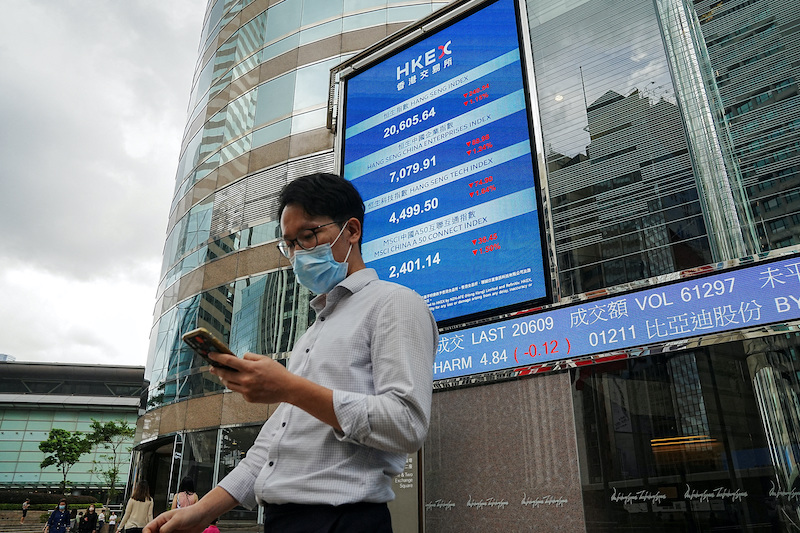Asia’s major markets were on the back foot again on Friday, retreating in the face of a gloomy global economic outlook, looming rate hikes in the US and more regulatory demands by Beijing.
The region’s bourses ended the week with another sell-off amid global recession warnings from the World Bank and the International Monetary Fund.
Japanese stocks closed lower and posted another weekly decline, as persisting worries about a slowdown and rising rates dragged Wall Street overnight.
Also on AF: Biden Orders Alert on Deals in Areas of Key China Interest
The Nikkei share average ended 1.1% lower at 27,567.65 after plumbing its lowest level since September 7 earlier in the session. The index lost 2.3% this week. The broader Topix index dropped 0.6%.
A study by the World Bank saying that a “moderate hit to the global economy over the next year could tip it into recession” particularly weighed on sentiment.
Technology stocks were weak, with the sector down 1.1%. Chip-making equipment manufacturer Tokyo Electron, a major contributor to the Nikkei, dropped 4.3% and weighed the most on the index.
China stocks saw a hefty fall, dragged down by securities firms after the cabinet asked them to slash service fees, though data showing surprising economic resilience in August lent some support to the market.
Shares in securities firms slumped more than 5%, dragging the financials index 2.6% lower and the blue-chip CSI 300 Index tumbled 2.4%, dropping the most since May 6.
But faster-than-expected growth in factory output and retail sales in August shored up the recovery from the effects of Covid and heatwaves, though a deepening property slump weighed on the outlook.
Hong Kong Tech Giants Drag
The Shanghai Composite Index dipped 2.3%, or 73.52 points, to 3,126.40, while the Shenzhen Composite Index on China’s second exchange dropped 2.25%, or 46.19 points, to 2,005.60.
Tech giants listed in Hong Kong declined 1.2% and the Hang Seng Index dropped 0.9%, or 168.69 points, to 18,761.69.
Meanwhile, China’s yuan weakened past the psychologically important 7-to-the-dollar level for the first time in two years.
Elsewhere across the region, stock markets were also weaker, with Indonesia on track for its worst session since early July after rising to a record on Thursday. Equities in Jakarta, Taipei and Seoul dropped between 0.7% and 1.7%.
Indian stocks slipped with Mumbai’s signature Nifty 50 index down 1.7%, or 304.40 points, at 17,573.00.
Yen Hurtles to Three-Decade Lows
Globally, investors were already bracing for a hefty US rate hike next week. In early European trades, the pan-region Euro Stoxx 50 futures were down 0.8% at 3,517, German DAX futures were down 0.9% at 12,849, FTSE futures were down 0.6% at 7,247.5.
“There is pain emerging in the equities markets and we are entering a phase where there will be further liquidation because rates are going to stay higher for longer,” Suresh Tantia, senior investment strategist at Credit Suisse, said.
“A strong US dollar does not help Asian markets and it will be a further negative for this region’s equity markets.”
The dollar dropped 0.14% against the yen to 142.95, after being down by 0.4% earlier in the session.
Japan’s threats of currency intervention might slow but not stop the yen from hurtling towards three-decade lows before the year end, market analysts and fund managers say.
US crude ticked up 0.3% to $85.36 a barrel. Brent crude rose to $91.24 per barrel.
Key figures
Tokyo – Nikkei 225 < DOWN 1.1% at 27,567.65 (close)
Hong Kong – Hang Seng Index < DOWN 0.9% at 18,761.69 (close)
Shanghai – Composite < DOWN 2.3% at 3,126.40 (close)
London – FTSE 100 < DOWN 0.1% at 7,273.06 (0935 BST)
New York – Dow < DOWN 0.6% at 30,961.82 (Thursday close)
- Reuters with additional editing by Sean O’Meara
























